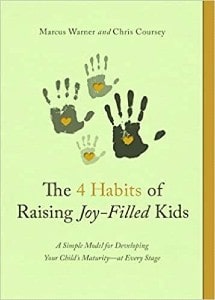Preview:
Dr. Marcus Warner: You can’t grow joy in your children if you don’t have any joy w- you know, in your life, so you have to find ways to build that joy relationally with your spouse, with your kids, with friends. The more joy that you create, uh, relationally in your life, the more joy you’re gonna be able to share with your kids.
End of Preview
John Fuller: That’s Dr. Marcus Warner and he’s with us today on Focus on the Family, along with his co-author, Chris Coursey. Your host is Focus president and author, Jim Daly, and I’m John Fuller.
Jim Daly: You know John, I want my boys to have happiness in whatever career they pursue, what have you. I want them to feel that happiness in what the Lord calls them to, right? That’s a normal, parental thing. But happiness can be so fleeting. Uh, circumstances change in a heartbeat. You know, there’s some downturn, there’s some negative situation and your world turns upside down. Your happiness is perhaps, lost or certainly, fleeting.
John: Mm.
Jim: Um, I am more interested in joy. Joy seems much more rooted in the core spiritual side of the human being.
John: Yeah, it seems deeper.
Jim: Deeper, right? Where you have joy, circumstances don’t persuade you to feel differently. Joy is joy and regardless of your circumstances, you’re gonna be rooted there, and I’m looking forward to today’s conversation with our guests who’ve written a great book, The Four Habits of Raising Joy-Filled Kids. So hopefully, every parent just leaned in however you’re listening, on the radio or through YouTube or what have you. Uh, having the ability to raise joy-filled kids is like job one.
John: Hmm, especially when life throws curve balls-
Jim: Right (laughs).
John: … and it always does.
Jim: Let me say joy-filled kids in Christ.
John: Ah, I think that’s a good distinction.
Jim: Yeah.
John: And, um, Dr., uh, Marcus Warner is here. He’s the president of Deeper Walk International and is married to Brenda, and they have two adult children and, uh, Chris Coursey is an ordained minister and pastoral counselor, married to Jen. They have two young boys and, uh, as you said Jim, together these men have written the book The Four Habits of Raising Joy-Filled Kids and we have that book here at the ministry. Our number’s 800, the letter A and the word FAMILY, or stop by focusonthefamily.com/broadcast.
Jim: Marcus and Chris, welcome to Focus on the Family. Good to have you back.
Chris Coursey: Thank you. It’s good to be here.
Dr. Warner: Yeah, we’re delighted to be here again.
Jim: O- okay, I gave it my best run there in the open. How do you differentiate happiness and joy and, and-
Dr. Warner: That’s a great question-
Jim: Yeah.
Dr. Warner: … ’cause that’s actually the first thing we’d probably dive into. The, um, from a … we found this stuff … This is actually a book written not from a Bible foundation but from a brain science foundation. So, our, uh-
Jim: But you are Christians.
Dr. Warner: But we are Christians-
Jim: (laughing).
Dr. Warner: Yes, we are. And so what we try to show is that the God who designed the brain also wrote the Bible and-
Jim: (laughs).
Dr. Warner: … that they’re compatible together.
Jim: Mm-hmm.
Dr. Warner: But we didn’t necessarily try to build this from the Bible up. We built it from the brain up and then showed how they’re compatible. But the book doesn’t even take that next step ’cause it’s designed to be something you can hand to a non-Christian.
Jim: You’re saying the Creator actually has his fingerprint on the brain science?
Dr. Warner: Uh (laughs), yeah, shocking as that is-
Jim: (laughing).
Dr. Warner: The, uh, uh, yeah an- and so, from the brain’s perspective, joy is not a choice. Uh, joy is relational happiness. So, like, when I see my friend show up here, I feel a, a surge of happiness that I’m not having … oh, man, my wife’s be- I’d better be happy, right? It’s not a choice I’m making, it’s just something that happens in the brain, uh, because my relational circuits have turned on and the joy juice is kinda, collecting up there and I’m feeling really happy to see you.
Jim: Te- well, let’s explore that vulnerability, though, the way-
Dr. Warner: Mm-hmm.
Jim: … that I described it. I mean, happiness does seem to be fleeting at times. You can wake up in a happy mood. But again, joy is … seems more deeply rooted that regardless of my circumstances and what I wake up to, I’m gonna have a sense of joy today. That, there’s a distinction there for me. Am I right?
Dr. Warner: There is a big distinction and I’ll let Chris jump in on this too, but it’s the, uh, uh, for example, let’s say that my wife and I are going through some hard thing. Maybe we’re having a tough time with one of our kids. Maybe we’re having a tough time with finances. We can still have joy with each other. And the joy that we share relationally with each other will actually give us a greater capacity to handle all the hard stuff that we’re dealing with in other places. So our joy isn’t coming from the circumstances, it’s coming from our relationships. So at a spiritual level, the more joy I have in my walk with God, the more I can lean into that and it becomes a source that is always available to me no matter what’s going on.
Jim: Chris, uh, fold your response into this, but I wanna keep us moving. When you look at the idea that as parents, we should try to teach our children to be joyful, I think some parents you know, they may say, well one, you know, I’m kind of, a level-headed guy. I could hear this coming from dads particularly. You know, I don’t show a lot of emotion and I don’t know that it’s really important. My kid’s gonna be wired this way or that way and is joy a wiring issue, like, a personality type or is it something that we need to be intentional about as parents to teach your children joy?
Chris: You know, it’s a little bit of both. Uh, we, we now know that there’s a area in the brain that God designed that grows every time you see someone’s face light up to see you. You hear it in their voice, you see it in their body, their mannerisms and it grows throughout the life span, so it’s one of the few areas in the brain that can grow from the moment you’re born till the moment God brings you home, that part of the brain is growing.
Jim: That’s kind of, amazing actually, you think about it.
Chris: It is. It is, and that’s where you can see that God made us for joy-
Jim: Mm.
Chris: … and so, for fathers who might not always be the high-energy joy, when your children see that, that you do light up to see them, that in a sense, you know, neural scientists say that joy is when you’re the sparkle in someone else’s eyes.
Jim: (laughs).
Chris: So, and you know that’s neat-
Jim: I like that.
Chris: … because you know, as God’s children, we’re the sparkle in His eyes.
Jim: Yeah.
Chris: And so Marcus and I really wanted to get this message out there that look, we’re designed for joy and with a little bit of practice, a little joy can go a long way.
Jim: Yeah. Let me ask you, y- you write, Chris, specifically in the book about your wife Jen, who comes from what you called a low joy family. And I’m sitting there thinking, what, what? What is he talking about? What is a low joy family and how are they equipped uniquely to provide joy to their family?
Chris: You know, when the joy levels start to drop, what happens is fear increases, so if you don’t tend the garden, weeds are going to grow, and so one of the things that as Jen learned, uh, the science and really started to read her Bible with the lens of joy, she realized that in her family, there wasn’t a lot of glad-to-be-together joy. They all loved each other deeply, but there wasn’t a lot of this high energy, glad to see you when you walk into the room. Or, another thing that happened is joy’s counterpart was rest. They didn’t really know how to rest. And so when we don’t know how to quiet, it’s hard to hold onto joy because you know, fear will grow inevitably-
Jim: Mm.
Chris: … when joy starts to drop.
Jim: Yeah. Uh, Marcus, let me turn this one to you. How- how are joy and maturity tied together? And I, I’d be interested, this wasn’t specifically in the book, but like, extroversion and introversion … uh, extroverts can show joy-
Dr. Warner: Right.
Jim: … more easily, maybe, than an introvert, but ho- how is all that connected, maturity and joy, extroversion, introversion?
Dr. Warner: Oh, those are great questions. So the first one is, um, that joy and maturity are actually directly related, and they … what connects them is emotional capacity. That is, maturity can be defined as my emotional capacity. It’s my capacity to handle hard things and still act like myself and remain relational. So, you look at who the most mature person is in any room, and they’re the one who have … who can handle weight, and that weight doesn’t overwhelm them, they can still live with joy in spite of all of the weight.
Jim: Uh.
Dr. Warner: And so, if I’ve got all the weight of running an organization and I’ve got all the stresses in my life of other things, but I can still be relational with you and we can still share joy together, that’s maturity. Now, in terms of ec- introvert, extrovert, the, uh, introvert feels just as deeply joy with people as extroverts, they just don’t share it with as many people at once.
Jim: (laughing). Are you slapping down the extroverts here?
Dr. Warner: No-
Jim: No, I’m kidding (laughs).
Dr. Warner: I just … Yeah, I’m just saying extroverts tend to love sharing joy with as many people as possible and they leave that full up with energy, and introverts tend to like to be with just, uh, uh, one or two really good friends that they have a lot of joy with those people, and they get more energy that way.
Jim: That’s so good. In fact, let’s get into it ’cause you talk about an acronym, A … parenting is easy as ABC and then you add a D.
Dr. Warner: Right.
Jim: So what’s the ABCD of a joy-filled family?
Dr. Warner: So, ABCD, you can think about it. It goes from the right brain over to the left brain in order in terms of how they operate. A is attunement, so the first thing is, my job as a parent is to meet my child in their emotions, not to ask my child to meet me in my emotions.
Jim: That’s big.
Dr. Warner: That’s huge.
Jim: Mm. That is big (laughs) right there.
Dr. Warner: And, uh, what-
Jim: Yeah.
Dr. Warner: … too many of us are expecting our kid to say, can’t you see how upset I am? Can’t you see you’re making me angry? Instead of-
Jim: Mm.
Dr. Warner: Oh, I see where you’re at. I see what’s going on in your heart right now.
Jim: Ca- let me ask you in that way, sorry to interrupt-
Dr. Warner: No.
Jim: … but y- y- you know, when you’re talking about a three- to five-year-old, let’s say-
Dr. Warner: Mm-hmm.
Jim: … what does that look like and a 10-year-old and a 15-year-old and a 20-something? Just cover that really quick.
Chris: Yeah. So when children are younger, it’s more of a non-verbal process. So I can remember when, um, s- one time, my son wa- had fallen down and hurt his knee, and so what basically, what children do, they look at Mom or Dad’s face and go, “Am I going to be okay?”
Jim: Right.
Chris: And so, as parents, we still say things to comfort them, but it’s actually the sound of our voice, it’s the look on our face and they think, “Okay, I’m not alone, for someone’s with me.” And that right there, basically gives our children the best ability to recover from whatever’s going on. The reality that I’m not alone. Mommy, Daddy see me, they hear me and they get comfort and they get attunement.
Jim: Yeah, kinda what I heard was, “Don’t touch it, don’t cry.” (laughing). If you touch it, you’re not a man.
Chris: Yeah.
Jim: What? Where’d that rule come from? (laughing).
Chris: Yeah.
Jim: But Marcus, let’s go back to attuning, that’s the A of ABCD-
Dr. Warner: Mm-hmm, right.
Jim: Sorry to cut you off, keep going.
Dr. Warner: So the B is building bounce, and the idea is now that I see where you’re at, if I see that where you’re up is an upset place or an upset emotion, not only do I meet you there, but I wanna help you bounce back. So that means I need to stay relationally connected, relationally engaged until this problem has gotten small enough for you to feel like you can handle it. Like, y- can you go back and play now, or you okay? Are you able to … So I’m helping them bounce back from that, that’s the B.
Jim: Resiliency would be another word-
Dr. Warner: Resiliency-
Jim: … for that?
Dr. Warner: … would be another word for it, it just didn’t spell the, uh, crossword-
Jim: (laughs) got it.
Dr. Warner: That’s the word, yeah.
Jim: It’s simpler for us guys.
Dr. Warner: Yeah, yeah.
Jim: Particularly. But this for moms too.
Dr. Warner: Yeah, absolutely.
Jim: A, B.
Dr. Warner: So C is correct with care. And the idea behind correct with care is the idea of, but do A and B first before you correct, ’cause a lot of us are problem forward parents, and that is, we walk into the room, we see a problem and we explode with our emotions about the problem and we correct them about the problem, and then when we’re all done, we’re thinking, “Oh, maybe I should attune to them.” Right? (laughs) and it’s the last thing we do instead of the first thing that we do. And then the D is develop disciplines relationally, as opposed to just saying, “Go do this, go do that, you know, this is your job,” you know, I actually spend time with them and it becomes a bonding experience between us.
Jim: Yeah, I appreciate that and we’re gonna dive into more of these. But Chris, let me come back to you on the attuning part. I’m not gonna let you off the hook-
Chris: Yeah.
Jim: … there because we talked about the boo-boo.
Chris: Yeah.
Jim: But think of the older child, the teenager. How does that attuning work when you’re, you as a parent, you’re emotionally distraught because they missed curfew. Uh, or give some example that you know, this is attuning at an older level.
Chris: You’re exactly right and often the challenge for us parents is to keep on our relational brain, basically. Keep our relational brain working. As Marcus said, we tend to focus on problems and so with older children, this is where it’s really helpful. We validate and then we, we comfort. So validation just says, “Hey, I noticed you were late. Um, you know, what time were you supposed to be home?” And so I start by basically saying, “I see you. That must have been fun staying out later but there’s a problem because you weren’t here on time.” And then we talk about consequences.
Chris: So validation just says, “I see you. I see what you’re feeling.” Comfort is, “Okay, what helps us to get back to joy here?” So for older children, it’s more of what Marcus and I call the coaching with kids. It’s just, we’re validating, we’re comforting, “I s- I see here what time is it. What would be a good consequence here? What’s going to help us learn from this so it doesn’t keep happening?”
Jim: Yeah.
Chris: So consequences just help, help older children really learn, um, you know, to correct those things that need correcting.
Jim: And you know, one thing that I’ve observed in my own parenting is, uh, that our kids at least, there’s such a difference between a 17-year-old and a 20-year-old. There’s just something in the brain development which you guys have studied-
Chris: Mm-hmm.
Jim: … that, the maturation process is so rapid at that point. You’re thinking, “Oh my goodness, my teenager … ahh,” and then all of a sudden, they’re doing the dishes or they’re saying please and thank you, all the things you’ve (laughs) told ’em for years. It’s like they turn a corner.
Dr. Warner: Yeah. It, it does take practice. So we talk about the ABCD applies to all three levels, infants, children and adults, but it looks radically different about how it’s applied. And so, after we explained the ABCD, we, we break it down chapter by chapter. This is what it looks like with this age group-
Jim: Yeah, that’s good.
Dr. Warner: … because, because if you try to do exactly the same thing with your adult kids that you did with your children, it won’t work.
Jim: Yeah.
Dr. Warner: Right, so-
Jim: And we’re not gonna cover it all here, that’s why you need a copy of the book.
John: And the book is called The Four Habits of Raising Joy-Filled Kids, a simple model for developing your child’s maturity at every stage. And, uh, we would commend this to you and, uh, all the other resources we have. Stop by focusonthefamily.com/broadcast or call 800, the letter A, and the word FAMILY.
Jim: All right, we’ve hit attuning. Let’s move, uh, to a little more in-depth discussion about that building bounce, the B of ABCD. Uh, resiliency. Um, sometimes circumstances will teach a child that. Um, you know, you might have hardship-
Chris: Mm-hmm.
Jim: … and a child has to respond one way or the other. What are some intentional ways a parent living in this modern world where most of our needs are taken care of, really?
Chris: Mm-hmm.
Jim: Ho- how do we build bounce into a child when pretty much everything they need’s there?
Dr. Warner: So, at the infant stage, it’s about joy workouts and recovery workouts and, uh, we can talk about that a little bit but i- at the child level, it’s more about helping your kid learn what is satisfying to them versus what is temporarily pleasurable. And in the process, they learn how to work for and wait for what’s really satisfying.
Jim: Mm.
Dr. Warner: Um, and if they don’t know what’s satisfying, then they don’t know what’s worth working for. They don’t know what’s worth waiting for. But, and also, the more they discover that this is truly satisfying, they begin to … their identity gets more grounded, and now as they make the transition into the adult stage, they’re not still trying to find themselves. They already know what’s satisfying to them and now they’re looking for other people who also find that satisfying, and they, it becomes their group, that becomes their people.
Jim: What’s a practical way that you can do that? I, again, I’m thinking of personality type. My wife, she’s a never-open-the-wrapper-early person, so get her a birthday present, she’ll delay throughout the day to wait to open that birthday present till late as possible. I don’t get that. I’m like, up in the morning-
Chris: (laughs).
Jim: … “Where’s that birthday present? Let me rip it open.”
Chris: Yeah.
Jim: So I, you know, some of that, I don’t know if that’s a character that you’re born with or an imprint that you get. Ho- how do you teach to be, uh, you know, kind of, uh, long-suffering for those great rewards?
Chris: Uh, yeah, I mean, learning satisfaction would mean, you know, if m- if … my children loves candy, so they might-
Jim: What?
Chris: … eat a whole lot of candy, right?
Jim: (laughing).
Chris: And they’ll be very excited about that. Um, but they might learn that too much candy makes ’em feel sick. And so, part of satisfaction would be, “Hey, so what, you know, what did you learn from this? W- you know, was it fun eating the candy? What about what happened when you ate all that candy?” So as parents, we’re helping our children learn that satisfaction is not just temporary pleasures but you know what, if I stay up too late, that might be fun, but when I have to get up early to go to school, that is not fun, so I should go to bed earlier. And helping children with some chores and different things to s- to help them value hard work, so what comes with satisfaction is I learn to do hard things, even things I don’t feel like doing-
Jim: Yeah.
Chris: … so chores, my sons do a lot of chores around our house, and you know, there is a s- level of satisfaction when they can look at their handiwork and go, “Wow, look at that room you just cleaned,” and they see our faces light up. Wow, that was good. Or, if they you know, they didn’t do some of their jobs, they might see some disappointment on our faces. Say, “Well, you did this really well, but this over here … ” It’s kinda like, Jesus, um, talking to the early churches in, in the book of Revelation. You know, here’s some things you did right a- but here’s some things over here that you’re missing, and so we want our children to learn satisfaction, so they learn responsibility.
Jim: Sure. Let me ask you about the wisdom of indulging a child to excess to prove the lesson.
Chris: Hmm.
Jim: I mean, the candy one’s a good one. So, is one of the tactics possibly, that you let that child go, let ’em get sick? I mean, some people are gonna write, call, thinking, what are you talking about?
Chris: (laughs) yes.
Jim: But some parents will say, yeah. I mean, it does prove that they gotta be a little careful, but it’s risky.
Chris: It is. It is, but it is-
Jim: (laughs).
Dr. Warner: There are, there are always gonna be some kids that you can give them instructions and that’s all you need to do.
Jim: Right.
Dr. Warner: And then there’s other kids who they have to feel the pain of-
Jim: Right.
Dr. Warner: … what’s going on before that happens. And what we’re trying to do is be not, “I told you sho- so,” and shaming when that happens-
Jim: Mm-hmm.
Dr. Warner: … but to meet them in that and walk ’em back through. When we’re trying to teach satisfaction, what we’re really after here is, inspiring their creativity and finding the things that you know what, uh, it was way more satisfying to learn how to ski, to learn how to do gardening, to learn how to paint this than it was to just, you know, watch TV all day.
Jim: I think, uh, moving to C now, the correcting with care. So critical. I think most parents probably learn that over time. Some. I mean, you start probably too aggressive (laughs) in your parenting that way, then you learn to kinda, chill out a little bit and dial it back.
Dr. Warner: Mm-hmm.
Jim: But talk to that issue of correcting with care and how it relates to coaching and that being a good model.
Chris: Yeah, you know, what’s good about correcting with care is we’re actually more concerned about molding character ins- instead of simply behavior modification.
Jim: Right. That’s a good thought.
Chris: And that’s a big one, right? Because we want our children’s character to grow and be defined by joy and peace, and so a lot of the times it- in my home when we correct with care, again, we’re … we are present with our kids. They know that they’re not alone, but there are consequences to their behavior, so if they’re fighting and they’re being mean to each other, we actually let them repair, uh, wors- we’re around, we’re watching them, but we actually let them repair and say I’m sorry, and within a matter of time, they’re back to playing. But it’s, we are correcting those unwanted behaviors by staying relationally connected with them and saying, “Okay. You know, I see that you didn’t do what I asked you to do, so what needs to happen here, and what can happen here so that you learn from this and this doesn’t happen again?”
Jim: Yeah.
Chris: So we’re with our kids as they learn these things.
Jim: It’s a good, mindful thing, you know. How do I correct with care? You know, I’m concerned when you look at the Christian community particularly, we can be so focused on performance-
Chris: Yeah.
Jim: … and behavioral performance particularly, that we squelch the God-given joy in our children ’cause we’re, we’re always measuring.
Chris: Right.
Jim: Are you hitting the mark? Are you hitting the mark? Or you’re not hitting the mark, and we’re conveying that disappointment. Talk about the damage in that regard.
Dr. Warner: Well, it’s true. It’s tha … I- I’ve watched a lot of kids who go to, you know, their parents send ’em to Christian schools hoping they’re gonna get molded, they go, they go-
Jim: (laughs).
Dr. Warner: … to all this stuff and, and at the end, it’s like, the kid can’t wait to leave home. You know, like, they don’t want anything to do with their parents’ faith, they don’t want anything to do with it. And I’m like, what happened along the way?
Jim: Yeah.
Dr. Warner: And a lot of times, it isn’t that they didn’t get enough apologetics (laughs), right. It’s that they didn’t have enough joy in their relationships. There wasn’t joy with the people at church, there wasn’t joy with the people in their family, there wasn’t a joyful connection at the foundation on which to build all of the truth and the way-
Jim: Think of that. Wow.
Dr. Warner: So i- if you think about the way God designed the brain, everything happens on the right side of the brain first before it gets to the left side. We have tended to flip that in our parenting and our discipleship, to be honest, and that is that we lead with all the truth stuff on the left, and then … instead of leading with the relational bonding and joy bonding, um, processes on the right side of the brain.
Jim: No, that’s it. I mean, that’s the concrete thing. It’s easy to follow rules or point out when people aren’t following ’em. It’s the Pharisaism in our heart, right?
Dr. Warner: Yeah.
Jim: Then the Lord saying no, it’s relationship, relationship. Love your neighbor-
Dr. Warner: Mm-hmm.
Jim: Don’t judge your neighbor.
Dr. Warner: Right.
Chris: Yes.
Jim: And it’s so hard, especially in the parenting realm. I wanna get to the, uh, the analogy you use about an oxygen mask and, uh, I do have the experience of being in a aircraft that was decompressed and we had to put the masks on.
Dr. Warner: Hmm.
Jim: And can you believe it? After hearing the mask will not inflate a thousand times, the first thing I said is, “My bag’s not inflating.” (laughs). So (laughs).
Dr. Warner: Yeah, that’ll give you a little PTSD, won’t it?
Chris: Yeah, it’s a (laughing)-
Jim: We got down fine, but-
Chris: Oh, that’s good.
Jim: … it was a little scary.
Chris: Yeah, it would be.
Dr. Warner: Wow. Uh, well this … Chris, your analogy, why don’t you join in?
Chris: Yeah, you know what? I mean, Marcus and I, yeah, we do spend a lot of times on airplanes and as parents, um, we tend to just think we can ha- keep giving and giving out of we don’t have, and so what Marcus and I are hoping parents will walk away with in this book l- is, look, when you grow your own joy, that means inevitably, you will have more joy to give your children. And so we really hope this is also a good wake up call for parents that look, get your mo- oxygen mask on, start taking better care of yourself, start growing your joy with your family, with your community, and then that’s going to actually give you more of the good stuff to pass on to your kids-
Jim: Yeah.
Chris: … which is a win-win.
Jim: Put it on first and then help your child-
Chris: Yeah.
Jim: … next to you.
Dr. Warner: Right.
Chris: (laughs).
Dr. Warner: And, uh, you can’t grow joy in your children if you don’t have any joy w- you know, in your life, so you have to find ways to build that joy relationally with your spouse, with your kids, with friends. The more joy that you create, uh, relationally in your life, the more joy you’re gonna be able to share with your kids.
Jim: Yeah, that’s so good. I wanna make sure we cover your acronym PLAN-
Dr. Warner: Mm-hmm.
Jim: UH, How can we PLAN, P-L-A-N joy?
Dr. Warner: Yeah, this is actually a, call out to our other book, uh, The Four Habits of Joy-Filled Marriages (laughs) which uses the PLAN idea here, that is, uh, we grow joy by playing together. Uh, if, when you think about it when your friends with somebody, you play together. That’s one of the things you do. Um, you listen for emotions and not just problems. The main problem we run into into communication is that we listen and as soon as we hear the problem, we think we have them all figured out and we quit listening.
Jim: Mm.
Dr. Warner: Instead of actually taking the time to listen for the emotion, validate that emotion and then deal with the problem. Then the A is we appreciate. Every day, we’re finding something authentic to appreciate about, uh, the people in our lives, our spouses, our kids, and then nurturing a rhythm. Uh, that’s part of making sure that everybody gets a chance to rest, that we’re not just going, going, going all the time, that we are protecting the people in our environment from overdoing it, and so we- we’re creating a rhythm that makes this sustainable over time.
Jim: Hmm. Lastly, uh, let’s speak to the mom or dad, uh, listening or viewing today who is from that low joy family perhaps, and it produced, guess what? A low joy person, and they don’t value joy, uh, especially in the context of what it provides the household, the family. What do you say to them? How do they shake that off and try to do things differently?
Chris: Yeah, you know what’s good about this is a little bit of effort goes a long way here. So as parents, you know, go have coffee with a friend. Um, one of the great practical ways we can grow joy as parents is just sharing joyful stories, so with other parents, “Hey, what are some highlights of, uh, your parenting? What are some great things that, lessons and wisdom that you’ve learned?” And so, just really connecting with people, spending time with God. We ha- we have a God who’s glad to be with us-
Jim: Yeah.
Chris: Spending time in His word, but connecting with people that we genuinely feel they are glad to be with us and every time we do that, that’s actually investing in joy for you that will come across-
Jim: Yeah.
Chris: … and come down to your children.
Jim: Uh, Chris, Marcus, uh, I know that parent is out there, probably (laughs) by the thousands. I hear you, and you’re saying, you don’t understand the frustration that my teenager is causing in our home. It’s hard to come home and, and create an atmosphere of joy because this teenager is not behaving the way they need to behave, and they disrespect us and all those things. So there’s this tension and I’m still, this is like a, a major speed bump in your joy freeway.
Chris: Mm-hmm.
Jim: So how does a parent b- stay the adult and exhibit joy when their kids, one or more of them, is in a not as good a place as you’d want them to be in? Your frustration is coming out as a parent. How do you get that all corrected? In the next 30 seconds?
Dr. Warner: (laughs). Well, uh, 30 seconds is the key there (laughing). I think that, um, (laughs) the important thing here is you gotta one, take care of your own joy levels, make sure that you- they don’t deplete. Two, practice attunement with your kids even if they’re causing all kinds of problems. Find out, uh, what it is that they are feeling and validate that. You don’t have to agree that they should be feeling something in order to validate it. You’re simply acknowledging that that is, in fact, what they’re feeling. And the more often that happens, and the more authentic it is, the more trust you will begin to rebuild in that relationship. There are some relationships you can’t save.
Jim: Mm.
Dr. Warner: And so, you keep praying for them. You know, those are the classic prodigal situations and you pray for them, and you keep … you have to really keep your own joy levels high at that point and, uh-
Jim: Sure.
Dr. Warner: … keep the doors open.
Jim: Now that is really good and I didn’t- hadn’t even thought about that one where you have the deep prodigal child situation where it’s just angst when-
Dr. Warner: Yeah.
Jim: … if you’re talking, and when you talk.
Dr. Warner: Right.
Jim: So, uh, Marcus and Chris, this has been so good. Uh, there’s so much more and of course, when we’re doing an interview in 30 minutes, we’re never gonna be able to get to all the content, so this is one of those resources that you really need as a parent because it’s filled with approaches that you will benefit from, and your family and most importantly, your children. And, uh, we have your book available, The Four Habits of Raising Joy-Filled Kids right here at Focus on the Family, so (laughs) don’t hesitate. Uh, we’d love to send it to you if you can become a, a monthly partner or one-time gift we’ll send it as our way of saying thank you and if you can’t afford it, we’ll get it out to you and we’ll trust that those in the Christian community will take care of the cost of that.
John: And if you’re struggling with joy, maybe you feel like you don’t have it or, um, as we’ve talked today, we’ve touched on something that is really a trouble for you, uh, give us a call. We have caring Christian counselors here. They’d be happy to talk with you and maybe, uh, direct you to more resources and help. Our number, 800, the letter A, and the word FAMILY, or stop by focusonthefamily.com/broadcast.
Jim: Marcus, Chris, great to have you with us. Thank you.
Chris: Thank you. It was good to be here.
Dr. Warner: Yeah. We’ve really enjoyed it.
John: Yeah. And I hope you can join us again next time as we hear from Shaunti Feldhahn. She has tips on how you can change your relationships through the power of kindness.
Preview:
Shaunti Feldhahn: And I think that’s something that we often miss as Christians, is that yes, His truth is crucial, but if we can’t speak it in His love and His kindness, it’s far better in most cases, to stay silent, because we can often do more damage to His way- … and not bring glory to Him.





















